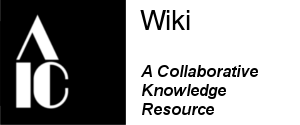Reback
Reback[edit | edit source]
The term reback refers to the means by which a damaged book spine is replaced in order to prevent separation of book components. A trained conservator should be involved in the completion of this process so that further wear is prevented. [1] The new spine itself may also be referred to as the reback. [2]
See also: BPG Circulating Collections; BPG Board Reattachment


Related Terms[edit | edit source]
Translations[edit | edit source]
| English | Reback |
| French | |
| Spanish | |
| Portuguese | |
| Italian | |
| German | |
| Russian | |
| Arabic | |
| Chinese (Traditional) | 更換書脊 |
Spine Damage[edit | edit source]
The reback process may be warranted for damage that includes wear, cracks, or tears along the spine and/or along the hinges of the book so that the boards are either partially or wholly separated from the spine. [3]
Replacing the Spine[edit | edit source]
Tools[edit | edit source]
Certain tools may be useful during the reback process, including scissors, a boxcutter, metal ruler, mini spatula, bone folder, book press, and brushes. [4] A proper adhesive like Archival PVA glue should also be used. [5]
New Spine Material[edit | edit source]
The new spine material is often chosen based on the type, color, and texture of the material used in the original book cover in order to maintain the original appearance of the book. [6] It is important that the new spine be created from nonperishable materials for the sake of preservation. [7] Materials like paper, cloth, and leather are often used in creating the new spine. [8]
Process[edit | edit source]
The original spine, if still attached, is removed from the book. [9] The new spine material is measured to match the height and width of the book plus two or three inches. A spine stiffener is also used, as the new spine material may not be sturdy enough to function alone. The spine stiffener is cut to fit the book's dimensions and glued in the center of the new spine. [10] The book cover is partially lifted from the boards at the hinges so that the new spine can be fitted underneath, allowing the new spine to be better attached to the cover, boards, and book in general. [11] Adhesive is applied to the uncovered board, the new spine is adhered, and the lifted cover is glued back over the new spine. A book press is then used to set the newly added spine. [12] If the original spine is considered salvageable, it often will be adhered over the new spine in order to maintain the book’s original appearance. [13] The original spine is trimmed to fit the new spine in a way that none of the information on the spine is lost. [14]
References[edit | edit source]
- ↑ NEDCC. 7.6 Conservation Treatment for Bound Materials of Value. Accessed October 26, 2015. https://www.nedcc.org/free-resources/preservation-leaflets/7.-conservation-procedures/7.6-conservation-treatment-for-bound-materials-of-value
- ↑ Glossary. Accessed October 26, 2015. http://www.ccaha.org/uploads/media_items/conservation-glossary.original.pdf
- ↑ Alibris. Glossary of Book Terms. Accessed October 25, 2015. http://www.alibris.com/glossary/glossary-books#r
- ↑ Illinois Periodicals Online at Northern Illinois University. Book Repair Manual. Accessed October 26, 2015. http://www.lib.niu.edu/1995/il950276.html
- ↑ Association for Library Collections & Technical Services (ALCTS). Book Repair Basics for Libraries. Accessed October 26, 2015. http://downloads.alcts.ala.org/ce/091411book_repair_basics.pdf
- ↑ Book Repair Instructions. Rebacking - Constructing a Replacement Spine. Accessed October 26, 2015. http://book-repair.com/tag/making-book-spine-replacement/
- ↑ About Bookbinding. Book Repair and Restoration: Book Rebacking Part 1. Accessed October 26, 2015. http://www.aboutbookbinding.com/Book_Repair/Book_Rebacking.html
- ↑ NEDCC. 7.6 Conservation Treatment for Bound Materials of Value. Accessed October 26, 2015. https://www.nedcc.org/free-resources/preservation-leaflets/7.-conservation-procedures/7.6-conservation-treatment-for-bound-materials-of-value
- ↑ Illinois Periodicals Online at Northern Illinois University. Book Repair Manual. Accessed October 26, 2015. http://www.lib.niu.edu/1995/il950276.html
- ↑ Northeast Document Conservation Center. Intermediate Book Repair: Rebacking. Accessed October 26, 2015. https://www.minitex.umn.edu/Storage/Preservation/Repair/Reback.pdf
- ↑ NEDCC. 7.6 Conservation Treatment for Bound Materials of Value. Accessed October 26, 2015. https://www.nedcc.org/free-resources/preservation-leaflets/7.-conservation-procedures/7.6-conservation-treatment-for-bound-materials-of-value
- ↑ Archiving Desk to Desk. Cloth Bound Book Repair: Spine Attaching. Accessed October 27, 2015. https://jacquelynpwhite.wordpress.com/2011/04/22/cloth-bound-book-repair-spine-attaching/
- ↑ The Currier Bindery. Methods: Rebacking. Accessed October 25, 2015. http://www.currierbindery.com/home/restoration/methods-rebacking/
- ↑ Illinois Periodicals Online at Northern Illinois University. Book Repair Manual. Accessed October 26, 2015. http://www.lib.niu.edu/1995/il950276.html
